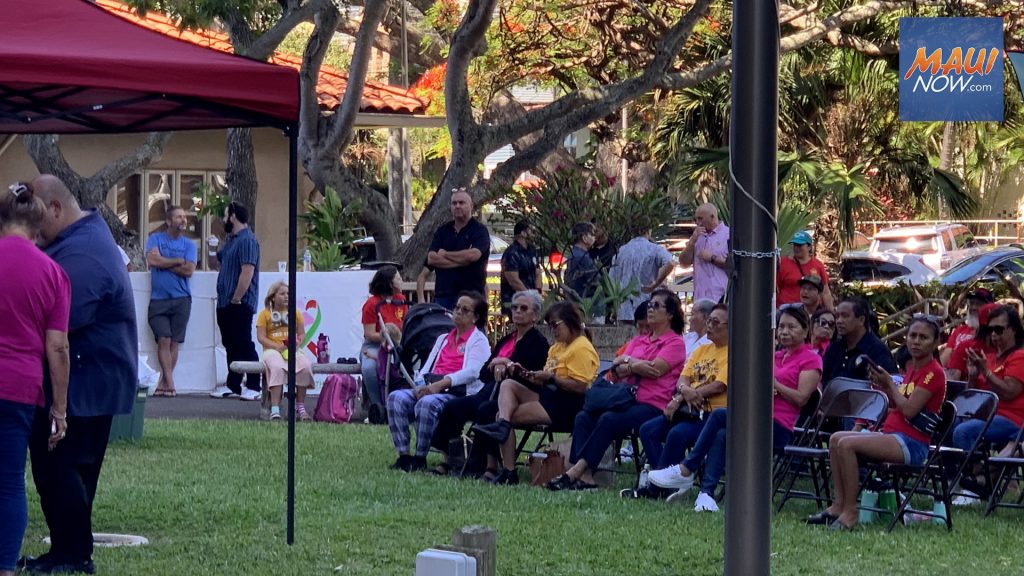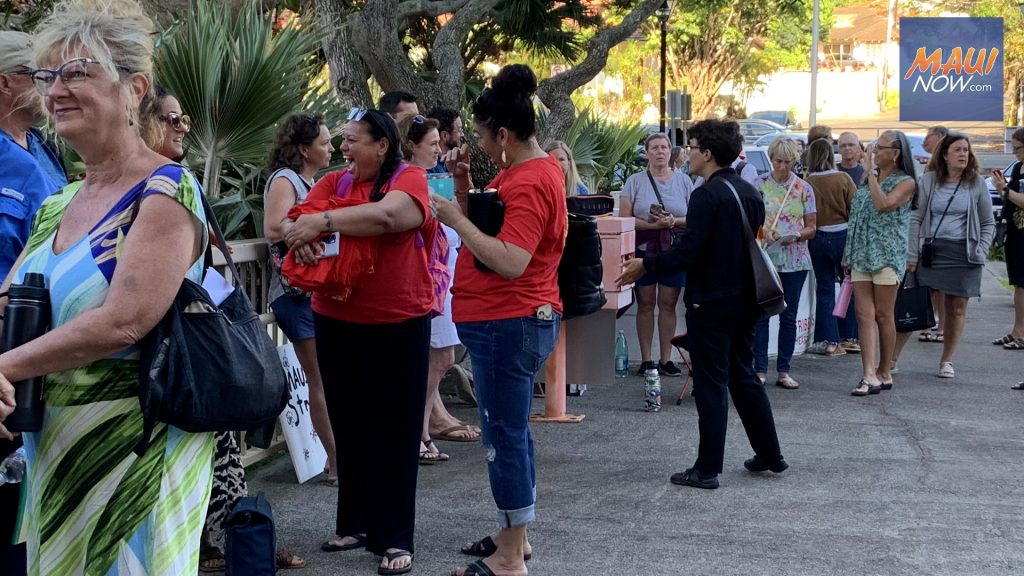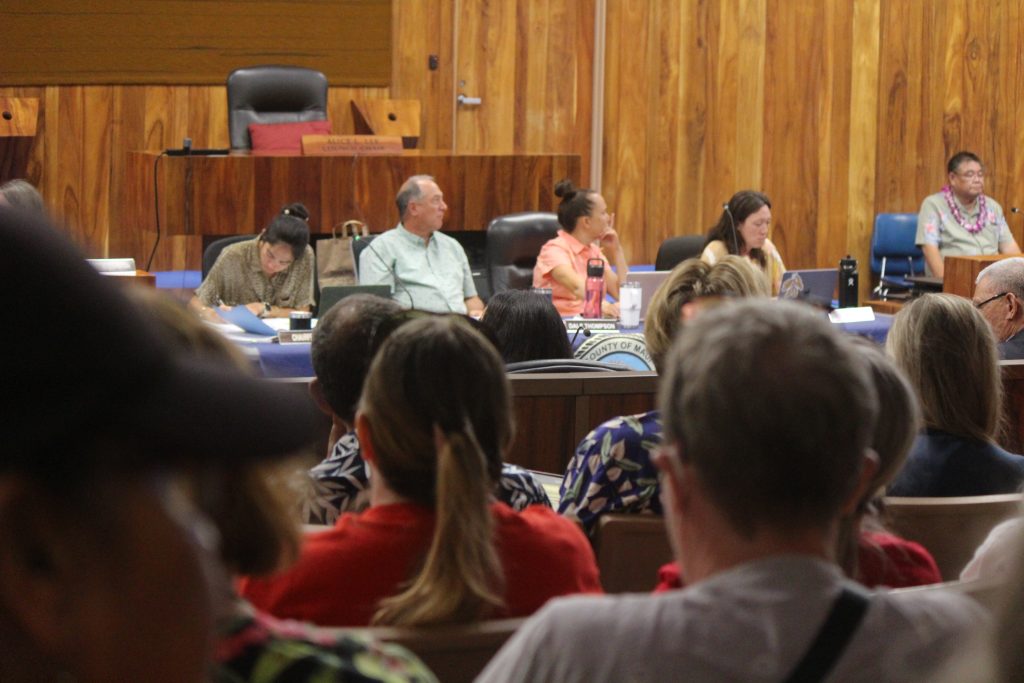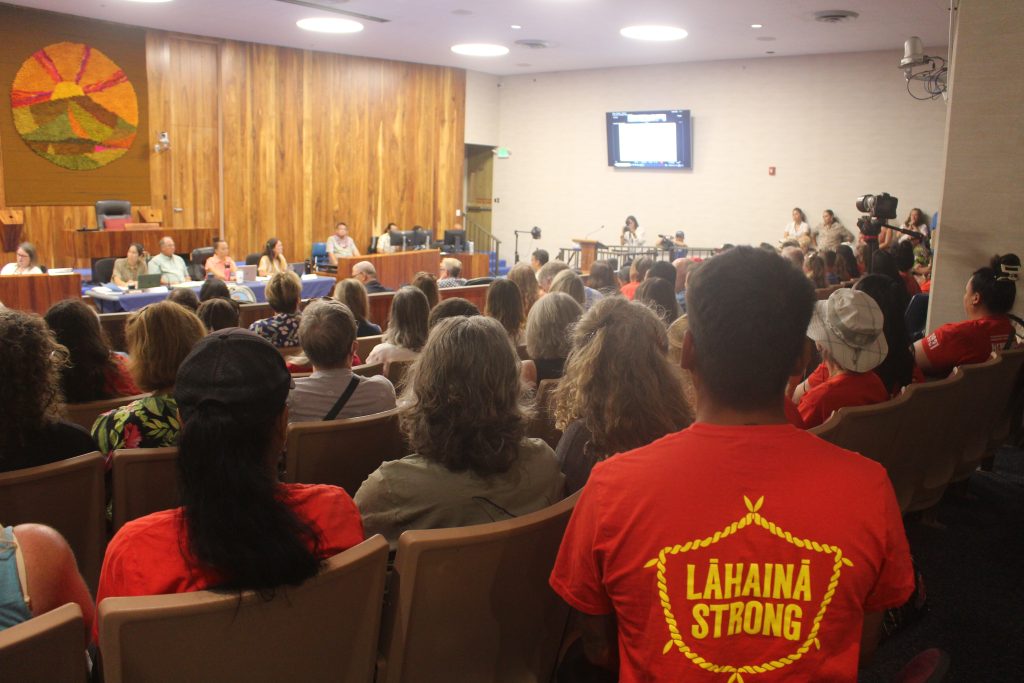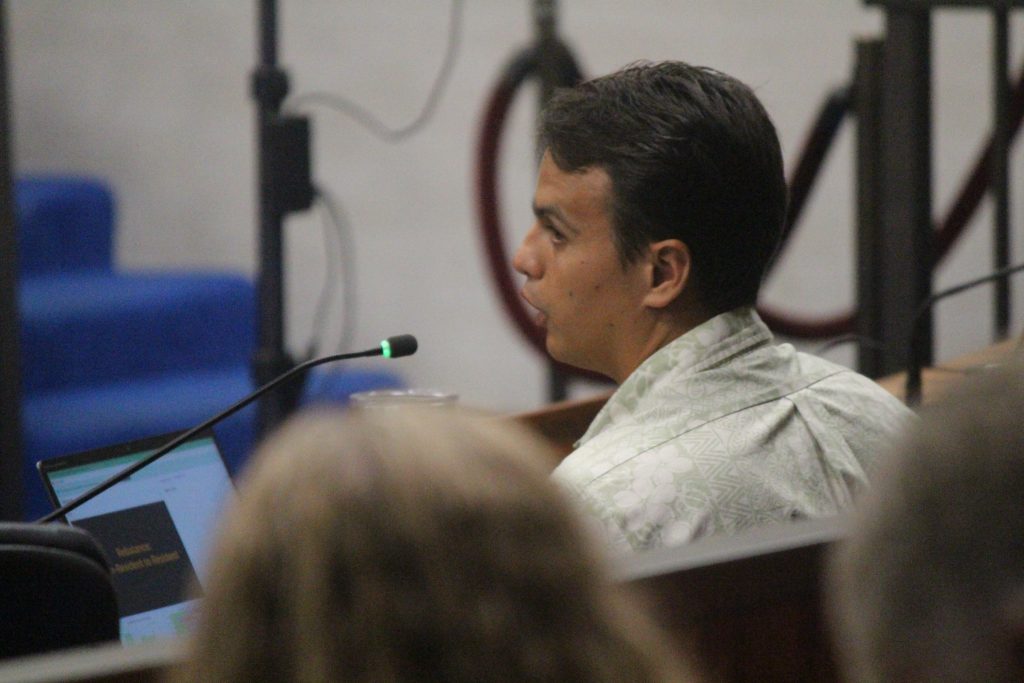Overflow crowd shows up for TVR hearing before the Maui Planning Commission

A standing-room-only crowd filled the Maui County Council chambers Tuesday morning to hear the start of debate over Mayor Richard Bissen’s proposed phase-out of approximately 7,000 transient vacation rental units in apartment-zoned districts.
In an opening statement, Bissen said Maui County has approximately 13,700 transient vacation rentals, and the in Maui County, and the proposed bill may impact 7,100 units in apartment-zoned districts.
So-called “Minatoya List” vacation rentals have been grandfathered, or allowed to continue, even after Maui County passed an ordinance in 1989 making transient accommodations non-permitted uses in apartment-zoned districts. Most of the affected units are in West and South Maui.
“We recognize that this bill is only part of the solution, and as we move forward, our team will be open to feedback, and will explore strategic tax policy and zoning changes that support our objective,” Bissen said. “We are looking forward to hearing testimony from our community and working with our Council to pass legislation that will prioritize the needs of our residents, protect the best interest of our County, and most importantly our community.”
Bissen said his administration is working with the Hawaiʻi Community Foundation to fund an economic impact study conducted by the University of Hawaiʻi Economic Research Organization. “This study will come at no cost to the County, and will provide our council members and other stakeholders with an objective and educated forecast and analysis of this bill,” he said.
Bissen reported that UHERO had released an analysis that shows the proposed bill “would increase Maui’s long-term residential housing stock by 13%, representing a dramatic increase in housing supply.”
Bissen reminded commission members that while people who own transient vacation rentals stand to lose money on their investments, “all investments involve speculation and risk.”
“In contrast you will also hear from our residents who are being priced out of their homes, struggle to make ends meet and are simply fighting to take care of their ʻohana. We simply cannot continue to prioritize offshore investments over the needs of our people. As mayor, my primary responsibility is to protect our people, and that starts with providing our residents with access to the most basic human need — housing.”
As of 4 p.m. Tuesday, the commission had heard testimony from nearly 100 people. Before lunch, testimony ran roughly 2-to-1 in opposition to the vacation rental phase-out bill. After lunch, testimony was about 4-to-1, opposed. As of 5:40 p.m., the commission had nearly completed in-person testimony, and was set to begin testimony from people participating online via Webex.
On Wednesday, the County reported that the commission meeting recessed at 8 p.m. Tuesday. The meeting was scheduled to resume at 9 a.m. July 9, at a location yet to be finalized.
According to a log of testifiers, 152 signed up to testify in-person before the Planning Commission, although 33 either canceled or were no-shows, leaving 119 in-person testifiers. Online, there were 144 people signed up to testify remotely. Of those, 29 testified and 19 were canceled or no-shows. The remaining online signup list will be continued on July 9.
After testimony is completed, the commission will be able to deliberate and determine its recommendation on the bill to the Maui County Council. The commission has the options to recommend passage or denial of the bill as submitted, approval of an amended version or deferral for more study.
Those testifying in opposition predicted deep and profound economic impacts for Maui County, including personal financial impacts for vacation rental operators; business closures; and unemployment, especially among those who serve vacation rentals with cleaning and maintenance. While many bill opponents acknowledge the dire need for residential housing, especially after the August wildfires, they say eliminating short-term rentals from apartment districts is not the answer. Many apartment buildings have small units not suitable for families, and the structures are decades old, in need of repairs and beyond the reach of most local residents to afford.
On the other hand, bill supporters urged planning commissioners to prioritize people over profits; and residents and local communities over the needs of visitors. Many residents don’t have a single residence to call their own, let alone multiple rental properties. And, the high cost of living, including housing, is pushing many people to leave their island home.
Anna Barbeau, a former Lahaina resident who now lives in Māʻalaea after being displaced by the wildfire, said that people left homeless after the disaster need stability and an affordable place to live.
“We’re getting pushed out of our own communities,” she said. “People come to Hawaiʻi mainly because of the aloha spirit, and yet it’s being buried under commercialism and greed. It’s devastating. It’s insulting. It’s unacceptable.”
Jackie Keefe testified in support of the bill, noting that Maui housing costs have risen exponentially.
Claims of a pending economic disaster are untrue, she said. “There’s no economy without workers.”
“Housing is a basic human right, and investment is not,” she said. Bill opponents “are choosing profits over people, and we are done with it.”
Don and Chris Kimble live part-time in one of the 488 short-term vacation rentals in an apartment-zoned area of Kapalua and rent out their unit when they stay at their home in Arizona. The Kimbles were waiting outside the Kalana O Maui Building to testify Tuesday and shared their written testimonies with Maui Now.

Eliminating short-term rentals would not produce affordable housing and lead to the loss of tax revenue that could fund development of more housing for residents, Don Kimble said in his written testimony, and “is likely to cause significant additional harm to the folks we are trying to protect.”
“My community consists of only small one or two bedroom units and offers very limited parking and storage,” he said. “Pets, smoking and motorcycles are not allowed. The buildings are more than 40 years old and are now seeing large special assessments that can cost owners tens of thousands of dollars per unit.”
Kimble said he pays nearly $4,000 per month to cover the association fees, special assessments, insurance and property taxes. “If my unit was reclassified for a resident homeowner, the monthly base maintenance cost would still be $3,000 per month. Keep in mind, the cost of mortgage and electricity are in addition to the base maintenance cost.”
Courtney Lazo, a Lahaina Strong organizer, said the wildfire took her family’s multi-generational home that housed 13 family members, as well as a construction business. She said her family was fortunate enough to evacuate and now live Upcountry.
Lazo said she’s a licensed real estate agent who has had vacation rental listings, but after the wildfires, she decided to “pivot” and no longer do business with transient accommodations. “I feel like it’s choosing between profit over people,” she said.
Phasing out vacation rentals in apartment districts is “an opportunity for us to bring family home, and, first and foremost, make sure no one else gets pushed out.”

Jordan Ruidas, founder and organizer of Lahaina Strong, said, before today’s hearing: “We have heard the cries of our community not having stable housing. We are going on 11 months now and our folks are still suffering.”
Phasing out vacation rentals from apartment districts was “long overdue,” even before the August wildfires, she said. “This is not going to solve the housing crisis in entirety, but this is a big first step.”
Ruidas acknowledged that Maui needs more housing development, but that has been challenging because of infrastructure shortfalls. For example, she said, the Pulelehua project is shovel ready in West Maui, but water is not available.
“So we need to look at other options,” she said. “We need to look at inventory that is already available to us.”
Ruidas said short-term rentals should be used for residential housing, “especially with the dire housing crisis that we are seeing right now.”
The Lahaina fires have turned Maui’s “housing crisis into a housing emergency,” she said.
The commission’s hearing drew overflow crowds into the Maui County Council Chamber on the eighth floor of the Kalana O Maui Building. The room has a capacity of 200, and before testimony began around 10:30 a.m., a representative of the Maui Fire Department said the room was over-capacity. He asked people who were standing in walkways and exits to leave the room. Outside, on the building’s front yard, chairs and a large-screen TV had been set up for people to watch the proceedings of the Maui Planning Commission.
The commission, along with the Molokaʻi and Lānaʻi planning commission, are set to review Mayor Bissen’s bill, which is aimed at opening long-term residential housing in apartment-zoned districts.
Shortly before the 9 a.m. start of the meeting, 113 people had signed up to testify in person. Each person will be allowed three minutes to testify. By the time the first testifier began, the number of people signed up to testify have reached nearly 150.
Editor’s note: This post has been updated a few times to provide updated information.

Commission Chair Kimberly Thayer said that if every person uses his or her full three minutes, then the commission would hear between seven and eight hours of testimony. The number of testifiers are only in-person in the Council Chambers. Many others are observing the proceedings and awaiting an opportunity to testify online.
Thayer asked people to respectful and not applaud and call out during a person’s testimony.
“We have a big day ahead, and emotions are running high,” Thayer said. “We are all in a canoe together. We all have to find a way to paddle forward together.”







